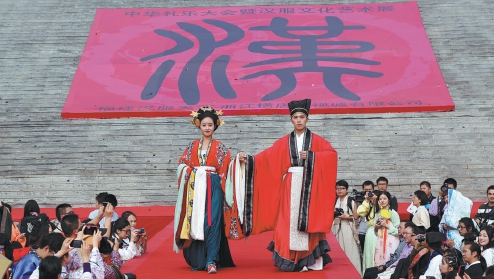 |
|
hanfu show is held at the first Chinese Ritual Music Conference in Hengdian, Zhejiang province, in 2013.[Photo provided to China Daily] |
Traditional hanfu clothing is gaining popularity among people seeking to access the virtues of their ancestors' aesthetics and philosophies, Jiang Yijing reports.
Beijing University of Chinese Medicine sophomore Wang Zixu recalls the first time he tried on hanfu, or clothing worn by the Han ethnic group before the Qing Dynasty (1644-1911).
The 20-year-old was reciting an ancient poem in a talent show seven years ago, when he was in middle school.
"It was cyan cotton hanfu with big, long sleeves. Unlike modern clothes, there were no zippers or buttons, but instead belts were used to secure the garments," the traditional Chinese medicine major recollects.
"I felt like I could better relate to our ancestors' aesthetics," Wang says. "It enabled me to carry myself in a refined manner. I even recited the poem with greater presence.
"I fell in love with hanfu there and then."
He joined the school's hanfu club, which hosts activities related to ancient clothing, poetry and calligraphy.
Such clubs have become popular among students.
They allow people who share an interest in hanfu to carry on the essence of Han culture from past millennia through to the modern day.
The rising popularity of Han-style clothing inspired Yang Na to write the book, The Return of Hanfu, in 2016.
The 33-year-old human resources worker at a national TV media group in Beijing was interested in hanfu as a teenager and began wearing the clothes over a decade ago.
She became passionate about it after reading an article online in 2006, prompting her to research her book.
The Return of Hanfu introduces ancient rites and chronicles the development of Han-style clothing in recent years. It has sold over 10,000 copies.
The book is a good reference that documents the reemergence of hanfu and may accelerate it in the future, says Renmin University of China's School of Public Administration and Policy professor Kang Xiaoguang.